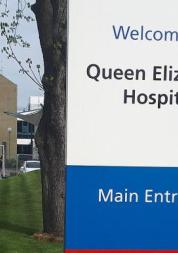Enter and View Report: Adult Inpatient, Ward 3 Queen Elizabeth Hospital

Ward 3 is a 34-bed respiratory care ward, with an additional three beds, bringing the total capacity to 37. The ward primarily admits patients from A&E but also frequently receives transfers from ITU and other hospital departments. During periods of high demand, patients not requiring respiratory care may also be admitted when other wards are at full capacity. An outpatient clinic also operates on the ward Monday to Friday.
Staff report that, on average, five to seven people are admitted and four to seven are discharged each day. However, patients who need neurorehabilitation often face long waits to move on. Some stay on the ward for months while waiting for a suitable place.
During our visits, we spoke with 10 patients, five family members, and eight staff members, and observed the ward environment and interactions between staff, patients, and visitors.
What We Found
We found a calm, clean, and well-organised environment where staff were professional, polite, and attentive. Patients described their care positively and praised the kindness and responsiveness of nurses and doctors. Families highlighted the friendliness of staff and the sense of reassurance they provided. Staff also spoke about strong teamwork and a shared commitment to delivering good care.
The ward layout was thoughtfully arranged, and efforts had been made to maintain patient dignity and privacy, even when accommodating extra patients. Signage was clear and accessible, and the ward included a dedicated family room and useful information was on display. However, we noted that this family space could be enhanced and that there was no visible information about Martha’s Rule to help patients and relatives escalate concerns.
Areas for Improvement
While most feedback was positive, a number of areas for improvement were raised:
- Some patients reported delays in responses to call bells and unmet basic needs, such as being left thirsty or not receiving promised help. These lapses, though not widespread, affected patients’ sense of being valued and safe.
- Relatives told us they often felt left in the dark about patient progress and had to chase updates. More proactive communication would help reduce stress and improve trust in the care process.
- Staff highlighted several logistical issues, including a lack of quiet space for clinical work, occasional shortages of essential supplies like gloves, and uncoordinated break schedules that sometimes left bays unattended.
- Concerns were raised about the attitude of some bank staff, with permanent staff needing to step in to maintain patient comfort and confidence.
Summary
Ward 3 offers a supportive and compassionate care environment, with many examples of excellent practice in patient interaction, teamwork, and ward organisation. However, there are opportunities to strengthen care further—particularly around consistent responsiveness, proactive communication with families, and staff working conditions. Addressing these areas would support the ward’s efforts to provide high-quality, person-centred care where everyone feels safe, respected, and informed.
Download the full report here
If you would like this report in a different format, please contact caitlin@healthwatchgreenwich.co.uk
